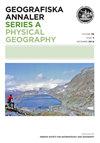Proglacial lake expansion and glacier retreat in Arctic Sweden
IF 1.8
4区 地球科学
Q3 GEOGRAPHY, PHYSICAL
Geografiska Annaler Series A-Physical Geography
Pub Date : 2022-10-02
DOI:10.1080/04353676.2022.2121999
引用次数: 0
Abstract
ABSTRACT Proglacial lakes have increased in number and extent in Arctic Sweden since the 1950s/1960s as glaciers have retreated dramatically. Interrogation of Rapid Eye imagery highlights that some lake terminating glaciers had substantial (>100 m) rates of retreat between 2010 and 2018, with one other land terminating glacier also retreating at a similar rate. However, analysis of a regional remote sensing time series suggests that proglacial lake formation in this period across the area has not been uniform. Despite glacier accumulation areas having similar maximum elevations (∼2,000 m) and similar alpine topography, proglacial lakes in the southern area (Sarek) were found to be significantly smaller than proglacial lakes in the northern area (Kebnekaise), which had smaller glaciers within corries and more prominent terminal moraines. Therefore, it cannot be assumed that proglacial lake formation will occur as glaciers retreat in response to elevated air temperature, particularly as only 33% of glaciers had proglacial lakes in their forefield. Thus, whilst it cannot be assumed that proglacial lakes will accommodate water currently held in glaciers, the 108 lakes mapped here present a substantial area (4.767 ± 0.377 km2) of fresh water that has not previously been included in the Global Lakes and Wetlands Database (GLWD). This inventory therefore provides an important dataset that can be used to underpin our understanding of the role of proglacial lakes within the hydrological system in this area of the Arctic.瑞典北极前冰期湖泊扩张与冰川退缩
自20世纪50年代/ 60年代以来,由于冰川急剧退缩,瑞典北极地区的原冰期湖泊的数量和范围都有所增加。对Rapid Eye图像的分析显示,在2010年至2018年期间,一些湖泊末端冰川的退缩速度很大(>100米),另一个陆地末端冰川也以类似的速度退缩。然而,对区域遥感时间序列的分析表明,这一时期整个地区的前冰期湖泊形成并不均匀。尽管冰川堆积区具有相似的最高海拔(~ 2000 m)和相似的高山地形,但发现南部地区(Sarek)的原冰湖明显小于北部地区(Kebnekaise)的原冰湖,后者在corries内具有较小的冰川和更突出的终端冰碛。因此,不能假设冰川因气温升高而退缩会形成原冰湖,特别是只有33%的冰川在其前场有原冰湖。因此,虽然不能假设原冰期湖泊将容纳目前冰川中的水,但这里绘制的108个湖泊显示了大量(4.767±0.377平方公里)的淡水,这些淡水以前没有包括在全球湖泊和湿地数据库(GLWD)中。因此,这份清单提供了一个重要的数据集,可以用来巩固我们对前冰期湖泊在北极地区水文系统中的作用的理解。
本文章由计算机程序翻译,如有差异,请以英文原文为准。
求助全文
约1分钟内获得全文
求助全文
来源期刊
CiteScore
3.60
自引率
0.00%
发文量
12
审稿时长
>12 weeks
期刊介绍:
Geografiska Annaler: Series A, Physical Geography publishes original research in the field of Physical Geography with special emphasis on cold regions/high latitude, high altitude processes, landforms and environmental change, past, present and future.
The journal primarily promotes dissemination of regular research by publishing research-based articles. The journal also publishes thematic issues where collections of articles around a specific themes are gathered. Such themes are determined by the Editors upon request. Finally the journal wishes to promote knowledge and understanding of topics in Physical Geography, their origin, development and current standing through invited review articles.

 求助内容:
求助内容: 应助结果提醒方式:
应助结果提醒方式:


